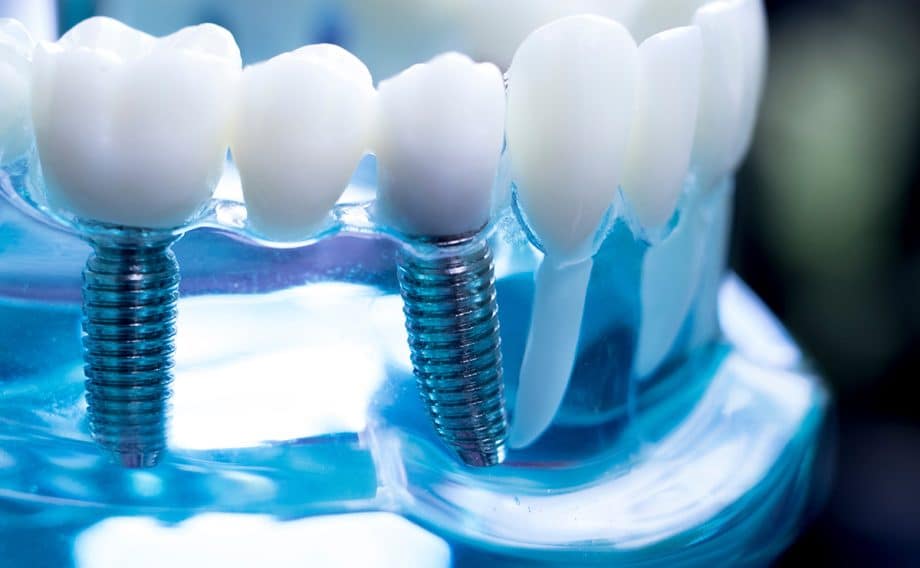Tooth damage and loss have significant physical, emotional, and esthetic implications on people’s lives. When someone loses a tooth or damages it (due to trauma or tooth decay), it is important to find a replacement option as soon as possible to avoid further complications. When a tooth is lost, adjacent teeth start to shift, bone loss occurs, and the overall harmony and function of the mouth and jaws are affected.
The good news is that restoring the health, appearance, and functionality of your smile has never been easier with dental implants. Before scheduling your dental implant consultation appointment with Dr. Khader at Community Oral and Maxillofacial Surgery, here is what you need to know about dental implants, including whether you’re a good candidate for them.
Who Might Need Dental Implants?
Dental implants are screw-shaped titanium (or less commonly ceramic) posts that replace the roots of missing teeth. This provides a strong, durable, permanent foundation upon which an abutment can hold a tooth-colored dental crown. The result is a tooth replacement that looks, feels, and functions like your natural tooth. Unlike traditional dentures or bridges, you’ll never have to worry about your dental implant shifting, falling out, or needing to be replaced. Even better, dental implants prevent surrounding teeth from shifting and help maintain a healthy jawbone. Dental implants can benefit anyone with one or more severely damaged or missing teeth.
Who is Not Suitable for Dental Implants?
While dental implants are a good option for most individuals who are missing one or more teeth, not everyone is a good candidate for them. Some factors that could prevent you from being eligible for dental implants include:
- Gum disease: Gum disease often comes with inflammation, which can make it harder for the implants to fuse together with your jawbone. People with gum disease should have it treated before getting dental implants.
- Smoking: Cigarette use negatively affects the healing process of a dental implant. The healing process could be delayed or even fail- leading to infections and failure of the dental implant. Dr. Khader will talk to you about the risks of cigarette use when considering dental implants.
- Certain health conditions: If you have a condition that affects how your body heals, such as diabetes, AIDS, or cancer, your healthcare provider may recommend that you not undergo dental implant surgery.
- Insufficient jawbone: Because dental implants are inserted into your jawbone and the two fuse together, not having adequate bone available in your jaw could prevent you from being eligible for the procedure. Sometimes, a bone graft can be done to increase your available jawbone.
Are There Any Risks With Dental Implants?
While dental implant surgery is considered safe, every procedure comes with certain risks. As with any surgery, infection is possible during dental implant surgery. Additionally, damage to your sinuses or nerves can happen, although both are rare. It’s important to talk with Dr. Khader about the potential risks before getting a single-tooth implant or any other dental implant procedure.
What is the Success Rate for Dental Implants?
On average, dental implants have an impressive success rate ranging from 90% to 95%. However, several factors can influence the long-term success of dental implants. The quality and quantity of your jawbone play a significant role, as sufficient density is necessary for successful integration. Maintaining excellent oral hygiene, refraining from smoking around the implant placement procedure, and choosing a skilled implant dentist or oral and maxillofacial surgeon are essential. By addressing these factors, patients can increase the likelihood of a successful and long-lasting dental implant restoration.
Dental Implant Alternatives
Dental implants offer a variety of oral health benefits, but they’re certainly not the only tooth replacement option that can effectively replace your missing teeth. Traditional dentures and bridges can restore the appearance and function of your smile. If you’re missing one or more teeth, be sure to talk with your dentist about the pros and cons of each tooth replacement option to determine which is the best one for your needs.
Schedule Your Dental Implants Consultation at Community Oral and Maxillofacial Surgery
If you’re interested in achieving a healthy, beautiful, comfortable smile after missing one or more teeth, dental implants may be a good option for you. Contact Dr. Khader and the trusted team at Community Oral and Maxillofacial Surgery today to schedule your consultation. We look forward to helping you improve your quality of life with dental implants.

